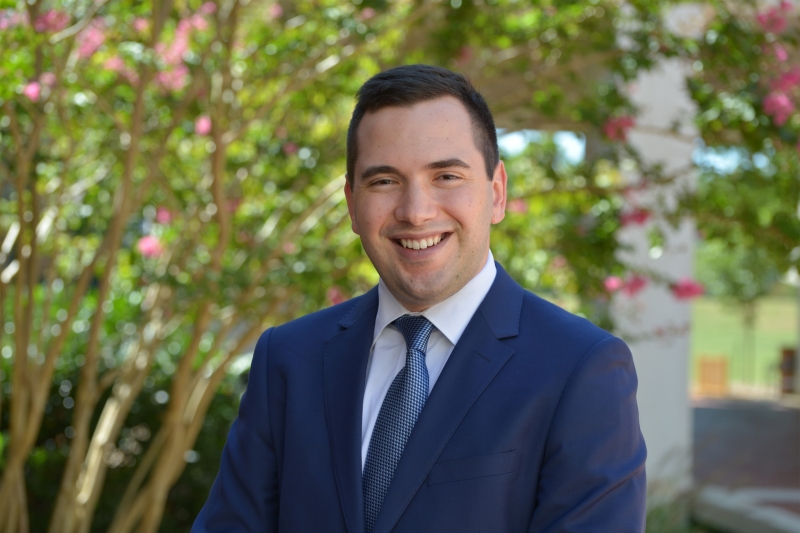At Work with Brilliant Minds This fall, Cory Morris '22, '25L worked at the United States Court of Appeals for the Federal Circuit.
Cory Morris ’22, ‘25L is from Rumford, Rhode Island. Cory is a Double General, graduating with a B.S. as a double major in Mathematics and Physics from Washington and Lee University. After graduation from W&L, Cory began his legal studies at the School of Law. At W&L Law, Cory is an active member of the Washington and Lee Law Review. After graduation from law school and upon acceptance to the DC Bar, Cory looks forward to helping inventors protect their inventions as a patent attorney. This fall, Cory participated in the law school’s WILF (Working in Law Full‑Time) program as a judicial extern with the United States Court of Appeals for the Federal Circuit in the chambers of the Honorable Jimmie V. Reyna.
How did you secure this externship?
In the spring of 2024, I contacted Judge Reyna’s Chambers by letter with a resume and character references enclosed. Chambers then offered me an interview and later informed me of their decision to welcome me aboard.
Describe your work experience and daily schedule.
Every day I looked forward to working at the Federal Circuit because there was always something or someone interesting to do, meet, or discover. I interacted closely with the chambers’ staff daily, including the Judge’s clerks. In particular, the clerks would have lunch with the judicial externs almost every day, where we usually enjoyed DC’s beautiful weather and sunshine in the Federal Circuit’s courtyard. Lunch also allowed me to further develop my relationship with and learn from Judge Reyna’s clerks. Moreover, lunch provided an opportunity to network with clerks from other chambers. In fact, one of the clerks I met was a W&L Law alumnus!
Once a month, further networking took place at the Giles S. Rich American Inn of Court. The Inn of Court was an opportunity to network and learn through its meetings featuring guest speakers presenting on various topics, such as judges sitting by designation and diversity, equity, and inclusion. The Inn of Court meetings, because of the Inn’s connection with the Federal Circuit, were attended by local patent practitioners and judges, including personnel from private law firms of all sizes, the United States Patent and Trademark Office, and the International Trade Commission to name a few.
What are some skills you developed?
I further developed my legal writing and research skills, as well as my oral advocacy skills. I worked on various research projects that resulted in a written work product. I also attended oral arguments each month, where I observed the top patent attorneys in the nation argue before the Federal Circuit. I also had the opportunity to present on a patent related topic to Judge Reyna and his clerks, where I responded to questions and engaged in a lively discussion.
What surprised you about the work you did during your externship?
I was surprised by the sheer number of appeals the Federal Circuit entertains. Every year there are about 1,500 appeals filed with the Federal Circuit across its various bases of jurisdictions, including appeals from the United States Patent and Trademark Office, patent claims brought in the district courts of the United States, the United States Court of Federal Claims, and the Court of Appeals for Veterans Claims.
Many of these filings are filed pro se (on the claimant’s own behalf, without legal counsel). This is often because the pro se litigants cannot afford or do not know the benefits of legal representation. Pro se litigants are nonetheless bound by the law and therefore their claims must be dismissed if the pro se litigants do not satisfy jurisdictional rules or each element of their claims. This made me realize the need for pro bono representation and the general need for lawyers to reach out and inform members of their community about effective legal representation.
What was your favorite aspect of your experience?
I loved having the opportunity to converse and work with such brilliant minds. Engaging the clerks at such a high level of intellect through the discussion of statutes, case law, policy, and equity was thoroughly enjoyable and enhanced my understanding of the law.
Has this experience helped you figure out your post graduate plans, and if so, how?
The experience generally introduced me to the federal appellate court clerkship and put the clerkship on my radar as a possibility of something to engage in down the road. Also, because the Federal Circuit has about 60% of its case load dealing with patent law, the experience further built upon my knowledge of patent law and taught me how to write more persuasive and effective briefs, both of which will prove very helpful to me as a patent prosecutor and litigator.
 Cory Morris ’22, ’25L
Cory Morris ’22, ’25L
You must be logged in to post a comment.